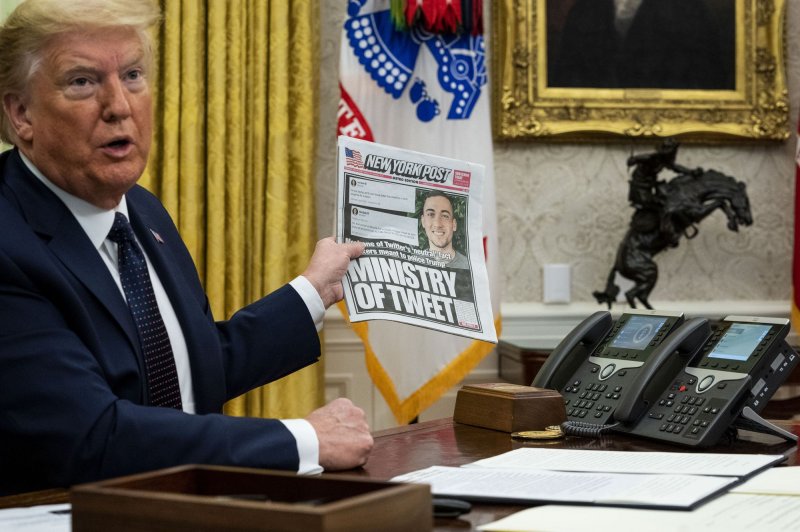1 of 2 | President Donald Trump holds a newspaper prior to signing an executive order on social media regulations Thursday in the Oval Office. Pool Photo by Doug Mills/UPI |
License Photo
May 28 (UPI) -- President Donald Trump on Thursday signed an executive order seeking to limit the legal protections for social media companies if they censure or edit user posts, telling reporters the companies have "unchecked power."
The presidential order comes two days after Twitter flagged a pair of Trump's tweets on mail-in voting as potentially misleading.
"We're here today to defend free speech from one of the greatest dangers," the president said during the signing ceremony in the Oval Office.
"A small handful of social media monopolies controls a vast portion of all public and private communications in the United States," Trump added. "They've had unchecked power to censor, restrict, edit, shape, hide, alter, virtually any form of communication between private citizens and large public audiences."
The executive order directs the Commerce Department to ask the Federal Communications Commission to reinterpret the 1996 law known as the Communications Decency Act. Specifically, Section 230 of the law protects Internet companies from lawsuits targeting the content of their sites.
Some legal scholars have said the law contains "26 words that created the Internet."
The order suggests social companies have not operated in "good faith," as is required by the law.
Trump said he expects this element of the executive order to be challenged by lawsuits and hopes Congress will pass legislation on the issue.
"I guess it's going to be challenged in court, but what isn't?" he asked.
The executive order also directs Attorney General William Barr to work with states to create their own regulations, and encourages federal agencies to review and potential limit their spending on social media advertisements.
Trump became caught up in a dispute with Twitter this week over two tweets the company deemed potential misinformation. In the posts, Trump said he expects widespread use of mail-in ballots in the forthcoming presidential election to be "substantially fraudulent."
Twitter's labels on the posts directs users to "get the facts about mail-in ballots."
The president responded with a series of tweets that accused the company of interfering with the elections, called the legitimacy of its fact-checking into question and said he would take action.
Trump's claims of mail-in ballot fraud were disputed by Federal Election Commission head Ellen Weintraub, who said they have "no basis" in fact. She warned the accusations could "undermine the American people's faith in our democracy."















